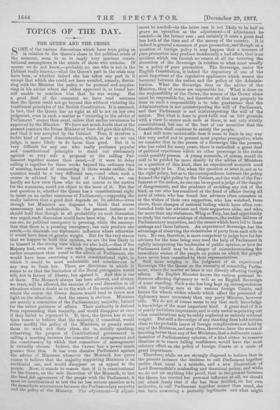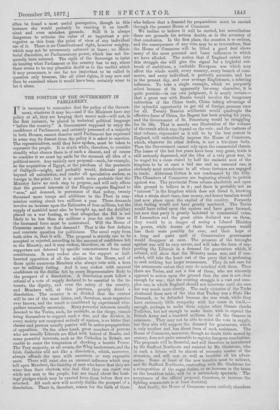TOPICS OF THE DAY.
THE QUEEN AND THE CRISIS.
SOME of the various discussions which have been going on in relation to the Queen's share in the political crisis of the moment, seem to us to imply very spurious consti- tutional assumptions in the minds of those who criticise. Of course we do not know,—probably no one who is not in the Cabinet really knows,—what the Queen's part in the crisis may have been, or whether indeed she has taken any part in it except that which she could not have avoided, namely, discus- sing with the Minister the policy to be pursued and acquies- cing in his advice where she either approved it, or found her- self unable to convince him that he was wrong. But a good deal of the comment we have read assumes that the Queen could not go beyond this without violating the traditional principles of the British Constitution. It is assumed, in fact, that the Queen has no right at all to act on her own judgment, even in such a matter as "recurring to the advice of Parliament " sooner than usual, unless that earlier recurrence be approved by the Minister. We have not much doubt that at the present juncture the Prime Minister at least did give this advice, and that it was accepted by the Cabinet. True, it involves a feeble kind of moral demonstration, which, as far as we can judge, is more likely to do harm than good. But it is very difficult for any one who really professes popular and constitutional principles to stand out obstinately against so very safe a proposal as the calling Par- liament together sooner than usual,—if it were to delay calling it together for three weeks beyond the ordinary time of meeting, instead of summoning it three weeks earlier, the question would be a very different one,—and when such a course is advised by the head of a Cabinet, we can hardly see how even those who do not concur in the motive for the summons, could yet object to the issue of it. But the real question is, whether the Queen has a constitutional right to insist on an earlier summons of Parliament,—supposing she really believes that a good deal depends on its advice,—even though her Ministers are disposed to think that course unnecessary and undesirable. In the present instance we should hold that though in all probability no such dissuasion was urged, such dissuasion would have been wise. As far as we can see, no political emergency is pressing, while the assump- tion that there is a pressing emergency, can only produce one result,—to diminish our diplomatic influence where otherwise it would have been of greater weight. But for the very reason that we happen to hold this opinion, we are the less likely to be biassed in the strong view which we also hold,—that if her Majesty had, even on her own sole judgment, insisted on an earlier recurrence than usual to the advice of Parliament, she would have been exercising a strict constitutional right, in which it would be most undesirable and mischievous in any way to limit her. There are directions in which it seems to us that the limitation of the Royal preregative would toll, not in favour of liberty, but against it. And this is one of them. The Monarch always has been allowed, and always, we trust, will be allowed, the exercise of a real discretion in all situations where a doubt as to the wish of the nation exists, and where the course the Crown desires would tend to throw new light on the situation. And the reason is obvious. Ministers are merely a committee of the Parliamentary majority, formed for the better guidance of affairs. Their authority is derived from representing that majority, and would disappear at once if they failed to represent it. If, then, the Queen has at any time reason to believe that the majority, if consulted, would either modify the policy of the Ministers, or greatly assist them to work out their ideas, she is, strictly speaking, subserving the purpose of Constitutional government in calling a meeting between the committee of management and the constituency by which that committee of management is virtually chosen. Indeed, the Crown has a power much greater than this, It can even dissolve Parliament against the advice of Ministers whenever the Monarch has grave reason to believe that the majority supporting Ministers is an accidental one, and would disappear on an appeal do the people. Now, it stands to reason that if it is constitutional for the Crown, on the sole discretion of the Monarch, to test the bona Ale agreement of the people with the Parliament, it must be constitutional to test the far lees serious question as to the immediate concurrence between the Parliamentary majority and the policy of the Ministry. The adjustment—if adjust- ment be needed—in the latter case is not likely to be half se grave an operation as the adjustment—if adjustment bs needed—in the former case ; and certainly it costs a great dear less both of the time and of the money of the country. It is indeed in general a measure of pure precaution, and though on a question of foreign policy it may happen that a measure of pure precaution may produce incidentally a bad effect, that is an' accident which can furnish no reason at all for fettering the discretion of the Sovereign in relation to what must usually be a policy of pure precaution. The Sovereign, under the English Constitution, is indeed the depository of one of the most important of the regulative appliances which secure the harmony between the nation and the policy of the Adminis- tration. What the Sovereign does on the advice of the, Ministry, they of course are responsible for. What is done on the responsibility of the Crown, the wearer of the Crown alone must be responsible for, and therefore all that can properly be done on such a responsibility is to take guarantees that the' Administration is not misinterpreting the will of Parliament, and that Parliament is not misinterpreting the will of the nation. But what is done in good-faith and on fair grounds with a view to secure such ends as these, is not only strictly, constitutional, but one of the best of our securities that the Constitution shall continue to satisfy the people. And still more undesirable does it seem to limit in any way this very useful and in general most popular prerogative, whom we consider that in the person of a Sovereign like the present, who has ruled for many years, there is embodied a great deal of political experience which no other personage in the realm could possibly possess. A young monarch, of course, would de well to be guided far more closely by the advice of Ministers on a question of this kind, than an experienced monarch need be or ought to be. For, when the question at issue is, not as to the right policy, but as to the correspondence between the policy deemed the right policy by the Cabinet, and the wish of the Par- liament or the nation, no one can be so good a judge of the danger of disagreement, and the prudence of avoiding any risk of the kind, as one who has remained at the head of affairs during all sorts of crises, who has found her advisers often mistaken as to the wishes of their own supporters, who has watched, from above, those changes of national feeling which have often con- founded both her advisers and their supporters alike, and whos far more than any statesman, Whig or Tory, has had opportunity to study the various mishaps of statesmen, the sudden failures of Parliamentary majorities, and the causes which have led to those mishaps and those failures. An experienced Sovereign has the advantage of observing the vicissitudes of party from each side in turn. No one, therefore, is more competent to judge how far her advisers for the time being may need the help of Parliament in rightly interpreting the tendencies of public opinion, or how far Parliament itself may be in danger of misunderstanding the immediate wishes of the people on points on which the people have never been consulted by their representatives.
Still more weighty is the judgment of an experienced Sovereign like the Queen on the necessity of consulting Parlia- ment, where the matter at issue is one directly affecting foreign affairs. No English Minister knows the various personal in- fluences affecting diplomacy so well as an English Sovereign of some standing, Such a one has long kept up correspondences with the leading men at the various foreign Courts, and knows the wheels within wheels which affect the personnel of diplomacy more accurately than any party Minister, however able. We do not of course mean to say that such knowledge is knowledge of the most important kind. A great deal of it fa of purely factitious importance, and is only useful as pointing out what considerations may be safely neglected as entirely without weight. But still a Sovereign of any standing does hold certain clues to the probable issues of foreign complications not held by any of the Ministers, and may often, therefore, have the means of knowing better than any of her Ministers, that a deliberate mani- festation of Parliamentary opinion, of a kind either to remove illusions or to renew failing confidence, would have the most salutary effect on the policy of foreign Courts at a crisis of great importance.
Therefore, while we are strongly disposed to believe that in the present instance the decision to call Parliament together earlier than usual is a mistake, and a new illustration of Lord Beaconsfield's misleading and theatrical policy, and while we do not see anything like proof, that in the present instance the Queen has exerted her personal influence at all, we should yet admit freely that if she has thus decided, on her Own authority, to call Parliament together sooner than usual, she has been exercising a perfectly legitimate and what might often be found a most useful prerogative, though in this instance she would probably be exerting it on insuffi- cient and even mistaken grounds. Still it is always dangerous to criticise the value of so important a pre- rogative as this from the point of view of any individual use of it. There is no Constitutional right, however weighty, which may not be erroneously enforced at times ; no Minis- terial discretion, no Parliamentary power, which has not fre- quently been misused. The right of the Sovereign to insist on hearing what Parliament or the country has to say, where there seems to be any plausible doubt as to the verdict which it may pronounce, is one far too important to be called in question only because, like all other rights, it may now and then be exercised where it would have been certainly wiser to let it alone.







































 Previous page
Previous page